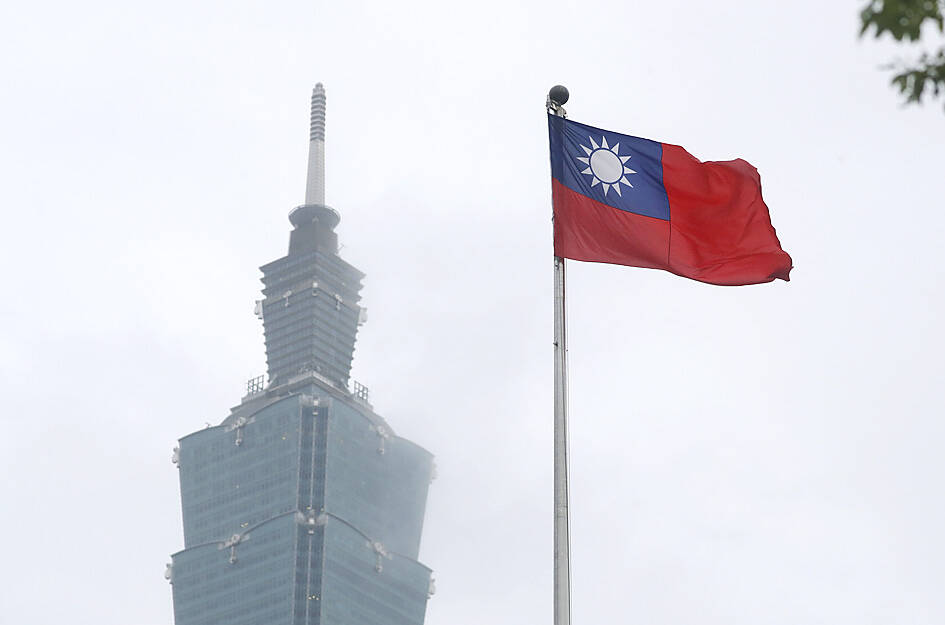Taiwanese banks’ fast disappearance from loan deals with Chinese companies is the latest indication of a collective effort to cut exposure to the world’s second-largest economy as the Chinese housing crisis rages on and geopolitical tensions linger.
The participation rate of Taiwanese lenders, defined by their involvement in any syndicated or club loan to Chinese company borrowers, has dropped to a record low of 1.7 percent this year, according to a Bloomberg-compiled data series dating back to 2010. The rate peaked at nearly 33 percent in 2013, before falling to 4 percent last year.
The slump reflects a broader move by Taiwan’s financial institutions, including industry leader Fubon Financial Holding Co (富邦金控), to reduce taking risks in an ailing Chinese economy, a process expedited by the COVID-19 pandemic and China’s ongoing property woes.

Photo: AP
The retreat coincides with the run-up to the Taiwan presidential election in January, which is set to be one the most fractured races ever and might reshape the region’s geopolitical landscape.
Several Hong Kong-based loan bankers at Taiwanese lenders told Bloomberg that participating in China deals would be challenging due to stricter credit approval and instructions from headquarters to reduce risks.
Many lenders have turned to markets such as Australia and Southeast Asia to look for business, said the bankers, who have asked not to be identified.
“Geopolitical risk is definitely on the radar after the US-China trade war, but slower economic growth, higher credit risks and more intense competition are also the reasons behind the pullout from the market,” Natixis SA senior economist Gary Ng (吳卓殷) said.
However, the retreat of Taiwanese banks might not have a major impact on China’s offshore credit market as borrowers have alternative sources of funding, according to Ng.
China still commands the largest share of syndicated loans in the Asia-Pacific excluding Japan so far this year, with companies from the country having received US$126 billion of financing, down from US$152 billion in the same period last year, Bloomberg data show.

Real estate agent and property developer JSL Construction & Development Co (愛山林) led the average compensation rankings among companies listed on the Taiwan Stock Exchange (TWSE) last year, while contract chipmaker Taiwan Semiconductor Manufacturing Co (TSMC, 台積電) finished 14th. JSL Construction paid its employees total average compensation of NT$4.78 million (US$159,701), down 13.5 percent from a year earlier, but still ahead of the most profitable listed tech giants, including TSMC, TWSE data showed. Last year, the average compensation (which includes salary, overtime, bonuses and allowances) paid by TSMC rose 21.6 percent to reach about NT$3.33 million, lifting its ranking by 10 notches

Popular vape brands such as Geek Bar might get more expensive in the US — if you can find them at all. Shipments of vapes from China to the US ground to a near halt last month from a year ago, official data showed, hit by US President Donald Trump’s tariffs and a crackdown on unauthorized e-cigarettes in the world’s biggest market for smoking alternatives. That includes Geek Bar, a brand of flavored vapes that is not authorized to sell in the US, but which had been widely available due to porous import controls. One retailer, who asked not to be named, because

SEASONAL WEAKNESS: The combined revenue of the top 10 foundries fell 5.4%, but rush orders and China’s subsidies partially offset slowing demand Taiwan Semiconductor Manufacturing Co (TSMC, 台積電) further solidified its dominance in the global wafer foundry business in the first quarter of this year, remaining far ahead of its closest rival, Samsung Electronics Co, TrendForce Corp (集邦科技) said yesterday. TSMC posted US$25.52 billion in sales in the January-to-March period, down 5 percent from the previous quarter, but its market share rose from 67.1 percent the previous quarter to 67.6 percent, TrendForce said in a report. While smartphone-related wafer shipments declined in the first quarter due to seasonal factors, solid demand for artificial intelligence (AI) and high-performance computing (HPC) devices and urgent TV-related orders

MINERAL DIPLOMACY: The Chinese commerce ministry said it approved applications for the export of rare earths in a move that could help ease US-China trade tensions Chinese Vice Premier He Lifeng (何立峰) is today to meet a US delegation for talks in the UK, Beijing announced on Saturday amid a fragile truce in the trade dispute between the two powers. He is to visit the UK from yesterday to Friday at the invitation of the British government, the Chinese Ministry of Foreign Affairs said in a statement. He and US representatives are to cochair the first meeting of the US-China economic and trade consultation mechanism, it said. US President Donald Trump on Friday announced that a new round of trade talks with China would start in London beginning today,